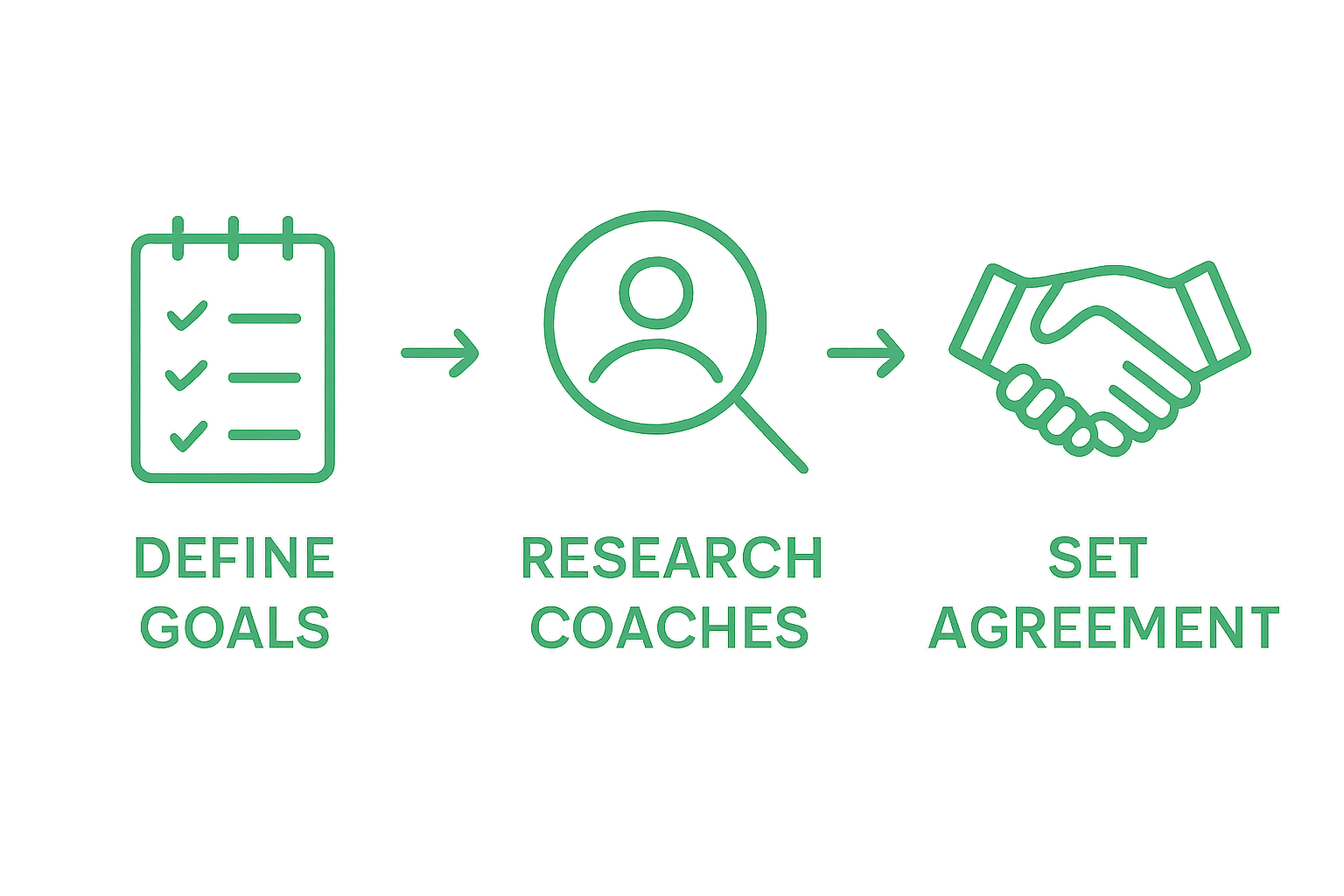
Business Coach Hire Even Needed for Side Hustle Success?
Many people wonder if finding the right business coach can be the difference between a side hustle that fizzles out and one that generates real income. Most people assume selecting a coach is all about flashy credentials or big promises. The truth is, coaches with the highest credentials do not always produce the best business results—what matters most is a proven track record of helping entrepreneurs hit very specific, measurable goals. The steps to choosing the right path might surprise you!
Table of Contents
- Step 1: Identify Your Business Goals And Needs
- Step 2: Research And Shortlist Potential Coaches
- Step 3: Evaluate Credentials And Experience
- Step 4: Schedule Initial Consultations
- Step 5: Decide And Set Up Your Coaching Agreement
- Take the First Step Towards Side Hustle Success
Quick Summary
Step 1: Identify Your Business Goals and Needs
Launching a successful side hustle begins with crystal-clear goal setting. This critical first step transforms your entrepreneurial dream from a vague concept into a strategic roadmap. Your objectives will serve as the foundational compass guiding every subsequent business decision.
Starting with precise goal identification means understanding exactly what you want to achieve. Are you seeking supplemental income, testing a business concept, or building a potential full-time venture? Each motivation requires a different approach. Some entrepreneurs aim to generate an extra $1000 monthly, while others want to validate a product idea or develop specialized skills.
The most effective goal-setting process involves deep personal reflection and honest assessment of your current capabilities. Begin by asking yourself targeted questions: What specific skills do you possess that could translate into a marketable service or product? What problems can you solve for potential customers? What unique perspective or expertise do you bring to the market?
Document your goals using a structured framework that makes them measurable and time-bound. Instead of saying “I want to start a business,” craft a specific statement like “I will launch a digital marketing consulting service generating $3000 monthly revenue within six months.” This approach provides clarity and creates accountability.
Learn how to refine your business goals with our comprehensive guide that breaks down the strategic planning process. Successful entrepreneurs understand that goal setting isn’t just about dreaming big but about creating actionable, realistic milestones.
Key verification indicators that you’ve completed this step effectively include:
- A written document outlining your specific business goals
- Clear understanding of your target market
- Identified personal skills and resources you can leverage
- Realistic timeline for initial business development
Remember, your initial goals are not set in stone. They represent a starting point that will evolve as you gain market insights and experience. Flexibility combined with strategic focus will be your greatest asset in transforming a side hustle into a thriving business venture.
Here is a checklist table to help verify you have effectively completed Step 1: Identify Your Business Goals and Needs.

Step 2: Research and Shortlist Potential Coaches
Navigating the world of business coaching requires a strategic approach to finding the right professional who can genuinely elevate your side hustle. This step is about transforming your vague coaching needs into a targeted search that connects you with a coach who truly understands your entrepreneurial journey.
Begin your research by leveraging multiple discovery channels. Professional networks like LinkedIn offer a treasure trove of potential coaches, while specialized platforms such as the International Coach Federation provide verified directories of experienced professionals. Don’t limit yourself to one source. Explore industry-specific forums, entrepreneurial communities, and recommendations from fellow founders who have successfully worked with coaches.
Your initial screening should focus on coaches with demonstrable experience in your specific business domain. A coach who has worked with tech startups will bring different insights compared to one specializing in service-based businesses. Look for professionals who have a proven track record of helping entrepreneurs at similar stages of business development. Credentials matter, but real-world experience and tangible client success stories are even more critical.
Discover strategic coaching selection techniques that can help you make an informed decision. When evaluating potential coaches, create a comprehensive assessment framework that goes beyond surface-level credentials.
Key criteria for your shortlist should include:
- Demonstrated expertise in your specific business vertical
- Verifiable client testimonials and success stories
- Clear coaching methodology and approach
- Alignment with your communication style and personal values
- Transparent pricing and engagement models
Schedule initial consultation calls with your top 3-5 candidates. These conversations are not just interviews but opportunities to assess chemistry and potential synergy. Pay attention to how they listen, the questions they ask, and whether they seem genuinely interested in understanding your unique entrepreneurial challenges.
Successful completion of this step means having a refined shortlist of 2-3 coaches who not only meet your professional criteria but also feel like a potential strategic partner in your business growth. Trust your instincts. The right coach will not just provide advice but will challenge you, inspire you, and help you see possibilities you might have overlooked.
Below is a summary table comparing key considerations when researching and shortlisting potential business coaches for your side hustle.
Step 3: Evaluate Credentials and Experience
Certifications and professional backgrounds are the foundational markers of a business coach’s credibility. This critical step transforms your initial research into a methodical assessment of each potential coach’s true professional capabilities. Your goal is to move beyond surface-level credentials and uncover the genuine depth of their expertise.
Begin by verifying professional certifications through recognized coaching organizations. The International Coach Federation represents the gold standard in coaching credentials. Look for coaches holding credentials like Professional Certified Coach (PCC) or Master Certified Coach (MCC), which demonstrate rigorous training and proven professional standards. These certifications aren’t just fancy titles they represent comprehensive training in coaching methodologies, ethical practices, and strategic business understanding.
Experience trumps credentials, so dive deep into each coach’s professional history. Request detailed case studies or references that showcase their work with entrepreneurs similar to your business profile. Pay special attention to coaches who have navigated complex business environments and helped clients overcome challenges comparable to your own. A coach who has successfully guided multiple side hustles through growth stages will offer more practical insights than someone with theoretical knowledge alone.
Explore comprehensive coaching qualification insights to understand the nuanced world of professional coaching credentials.
Critical evaluation criteria should include:
- Academic and professional background relevant to entrepreneurship
- Years of active coaching experience
- Specific industry expertise matching your business sector
- Verifiable client success stories and testimonials
- Professional memberships and ongoing education
Don’t hesitate to conduct thorough background checks. Request initial consultation calls where you can directly inquire about their coaching philosophy, methodologies, and specific approaches to side hustle development. A transparent, confident coach will welcome such questions and provide comprehensive, specific answers that demonstrate their expertise.
Successful completion of this step means having a validated shortlist of coaches whose professional credentials and real-world experience align perfectly with your entrepreneurial goals. Remember, the right coach is not just a credential holder but a strategic partner who understands the unique challenges of building a successful side business.
Step 4: Schedule Initial Consultations
Initial consultations are the critical moment where potential business coaches transition from paper credentials to living, breathing strategic partners. This step is about creating meaningful connections that will determine whether a coach can genuinely propel your side hustle forward.
Preparation is key before these initial meetings. Develop a comprehensive consultation strategy that goes beyond casual conversation. Create a detailed document outlining your specific business goals, current challenges, and precise expectations from the coaching relationship. This preparation demonstrates your seriousness and helps coaches understand whether they can provide meaningful guidance.
Most professional coaches offer complimentary initial consultations lasting 30-60 minutes. These sessions are mutual evaluations where both you and the coach assess compatibility. Approach these meetings as strategic interviews, not just casual conversations. Prepare a structured set of questions that reveal the coach’s methodology, communication style, and depth of understanding about your specific entrepreneurial journey.
Unlock strategic consultation techniques to transform these initial meetings into powerful decision-making opportunities.
Critical discussion points during initial consultations include:
- Your specific business goals and current challenges
- Coach’s experience with similar entrepreneurial scenarios
- Proposed coaching methodology and expected outcomes
- Potential communication cadence and support structures
- Pricing and engagement models
Pay close attention to the coach’s listening skills during these consultations. A truly exceptional coach will ask probing questions that help you gain insights into your own business potential. They should challenge your assumptions while maintaining a supportive, collaborative tone. Watch for coaches who seem more interested in selling their services than understanding your unique entrepreneurial context.
Successful completion of this step means having conducted thorough initial consultations that provide clear insights into each potential coach’s capabilities. Trust your intuition alongside rational assessment. The right coach will feel like a strategic partner who can illuminate pathways you might not have considered, transforming your side hustle from a potential opportunity into a robust, growing venture.
Step 5: Decide and Set Up Your Coaching Agreement
The coaching agreement transforms your professional relationship from an informal conversation into a structured, results-driven partnership. This critical document serves as the blueprint for your entrepreneurial guidance, defining expectations, boundaries, and mutual commitments that will shape your side hustle’s growth trajectory.
Transparency is the cornerstone of an effective coaching agreement. The document should comprehensively outline the scope of coaching, including specific objectives, session frequencies, communication protocols, and precise deliverables. Resist the temptation to accept a generic template. Instead, work collaboratively with your chosen coach to craft an agreement that reflects your unique business goals and personal working style.
Financial terms require meticulous attention. Discuss and document the complete fee structure, including session rates, package options, and any additional support between scheduled meetings. Some coaches offer flexible pricing models like monthly retainers, per-session rates, or milestone-based payments. Understand the payment schedule, cancellation policies, and any potential performance guarantees or refund conditions.
Explore strategic coaching agreement frameworks to ensure comprehensive coverage of your entrepreneurial needs.
Key components your coaching agreement must include:
- Clearly defined coaching objectives and expected outcomes
- Session frequency, duration, and preferred communication channels
- Detailed pricing structure and payment terms
- Confidentiality and professional conduct guidelines
- Mechanism for reviewing and adjusting goals
Beyond the financial and logistical details, the agreement should establish clear communication expectations. Determine how you’ll share progress updates, what constitutes an emergency consultation, and how feedback will be exchanged. Some coaches provide additional resources like email support, quick messaging check-ins, or access to supplementary learning materials.
Successful completion of this step means having a comprehensive, mutually agreed-upon coaching contract that provides a clear roadmap for your entrepreneurial development. The right agreement feels like a collaborative tool, not a restrictive document. It should inspire confidence, outline a path forward, and create a sense of shared commitment to your side hustle’s success.

Take the First Step Towards Side Hustle Success
You have put in the work to clarify your business goals and carefully shortlist the right coach, but even with strong intentions, the road ahead can feel uncertain. Many founders struggle with translating personalized coaching advice into real business momentum. Gaps in actionable steps, hesitation on strategic direction, and second-guessing your decisions are common hurdles when building a side hustle from scratch. If you want ongoing guidance, prioritized actions, and a framework that adapts as you grow, you need a smarter solution to turn your entrepreneurial vision into real results. Throwing money at a coach may be premature.
Instead, siift can be your business coach! Gain tailored guidance, new insights, and step-by-step feedback designed for founders who need clarity on next moves. Use siift’s AI platform to transform expert strategy into concrete action and de-risk your founder journey with confidence. Start now and bridge the gap from business coaching to real-world traction—your side hustle deserves a smarter launch. Try siift today and discover what focused, unbiased support can do for your business.
Frequently Asked Questions
What are the first steps to take when starting a side hustle?
Starting a side hustle begins with identifying clear business goals and reflecting on personal capabilities. Document goals that are specific, measurable, and time-bound to create a strategic roadmap for your venture.
How do I choose the right business coach for my side hustle?
To choose the right business coach, research and shortlist potential candidates by leveraging professional networks, checking their expertise in your specific business domain, and reviewing client testimonials. Schedule initial consultations to gauge compatibility and coaching style.
What should I include in a coaching agreement?
A coaching agreement should outline the coaching objectives, session frequency, communication protocols, detailed pricing structures, and confidentiality guidelines. It serves as a roadmap for your relationship with the coach, ensuring transparency and mutual understanding.
How do I evaluate a business coach’s credentials and experience?
Evaluate a business coach’s credentials by verifying their certifications, such as those from the International Coach Federation. Look for coaches with relevant experience, client success stories, and industry expertise that aligns with your business needs.
Recommended

see where you really stand





.svg)
.svg.png)



.svg)

